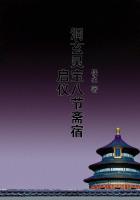Certainly, if ever a man found a guinea when he was looking for a pin it is my good friend Professor Gibberne. I have heard before of investigators overshooting the mark, but never quite to the extent that he has done. He has really, this time at any rate, without any touch of exaggeration in the phrase, found something to revolutionise human life. And that when he was simply seeking an all-round nervous stimulant to bring languid people up to the stresses of these pushful days. I have tasted the stuff now several times, and I cannot do better than describe the effect the thing had on me. That there are astonishing experiences in store for all in search of new sensations will become apparent enough.
Professor Gibberne, as many people know, is my neighbour in Folkestone.
Unless my memory plays me a trick, his portrait at various ages has already appeared in The Strand Magazine--I think late in 1899; but I am unable to look it up because I have lent that volume to some one who has never sent it back. The reader may, perhaps, recall the high forehead and the singularly long black eyebrows that give such a Mephistophelian touch to his face. He occupies one of those pleasant little detached houses in the mixed style that make the western end of the Upper Sandgate Road so interesting.
His is the one with the Flemish gables and the Moorish portico, and it is in the little room with the mullioned bay window that he works when he is down here, and in which of an evening we have so often smoked and talked together. He is a mighty jester, but, besides, he likes to talk to me about his work; he is one of those men who find a help and stimulus in talking, and so I have been able to follow the conception of the New Accelerator right up from a very early stage. Of course, the greater portion of his experimental work is not done in Folkestone, but in Gower Street, in the fine new laboratory next to the hospital that he has been the first to use.
As every one knows, or at least as all intelligent people know, the special department in which Gibberne has gained so great and deserved a reputation among physiologists is the action of drugs upon the nervous system. Upon soporifics, sedatives, and anaesthetics he is, I am told, unequalled. He is also a chemist of considerable eminence, and I suppose in the subtle and complex jungle of riddles that centres about the ganglion cell and the axis fibre there are little cleared places of his ******, little glades of illumination, that, until he sees fit to publish his results, are still inaccessible to every other living man. And in the last few years he has been particularly assiduous upon this question of nervous stimulants, and already, before the discovery of the New Accelerator, very successful with them. Medical science has to thank him for at least three distinct and absolutely safe invigorators of unrivalled value to practising men. In cases of exhaustion the preparation known as Gibberne's B Syrup has, I suppose, saved more lives already than any lifeboat round the coast.
"But none of these little things begin to satisfy me yet," he told me nearly a year ago. "Either they increase the central energy without affecting the nerves or they simply increase the available energy by lowering the nervous conductivity; and all of them are unequal and local in their operation. One wakes up the heart and viscera and leaves the brain stupefied, one gets at the brain champagne fashion and does nothing good for the solar plexus, and what I want--and what, if it's an earthly possibility, I mean to have--is a stimulant that stimulates all round, that wakes you up for a time from the crown of your head to the tip of your great toe, and makes you go two--or even three--to everybody else's one. Eh?
That's the thing I'm after."
"It would tire a man," I said.
"Not a doubt of it. And you'd eat double or treble--and all that.
But just think what the thing would mean. Imagine yourself with a little phial like this"--he held up a little bottle of green glass and marked his points with it--"and in this precious phial is the power to think twice as fast, move twice as quickly, do twice as much work in a given time as you could otherwise do."
"But is such a thing possible?"
"I believe so. If it isn't, I've wasted my time for a year. These various preparations of the hypophosphites, for example, seem to show that something of the sort . . . Even if it was only one and a half times as fast it would do."
"It WOULD do," I said.
"If you were a statesman in a corner, for example, time rushing up against you, something urgent to be done, eh?"
"He could dose his private secretary," I said.
"And gain--double time. And think if YOU, for example, wanted to finish a book."
"Usually," I said, "I wish I'd never begun 'em."
"Or a doctor, driven to death, wants to sit down and think out a case. Or a barrister--or a man cramming for an examination."
"Worth a guinea a drop," said I, "and more to men like that."
"And in a duel, again," said Gibberne, "where it all depends on your quickness in pulling the trigger."
"Or in fencing," I echoed.
"You see," said Gibberne, "if I get it as an all-round thing it will really do you no harm at all--except perhaps to an infinitesimal degree it brings you nearer old age. You will just have lived twice to other people's once--"
"I suppose," I meditated, "in a duel--it would be fair?"
"That's a question for the seconds," said Gibberne.
I harked back further. "And you really think such a thing IS possible?" I said.
"As possible," said Gibberne, and glanced at something that went throbbing by the window, "as a motor-bus. As a matter of fact--"
He paused and smiled at me deeply, and tapped slowly on the edge of his desk with the green phial. "I think I know the stuff. . . .
Already I've got something coming." The nervous smile upon his face betrayed the gravity of his revelation. He rarely talked of his actual experimental work unless things were very near the end.
"And it may be, it may be--I shouldn't be surprised--it may even do the thing at a greater rate than twice."














